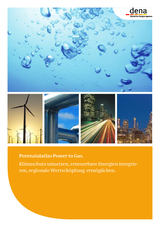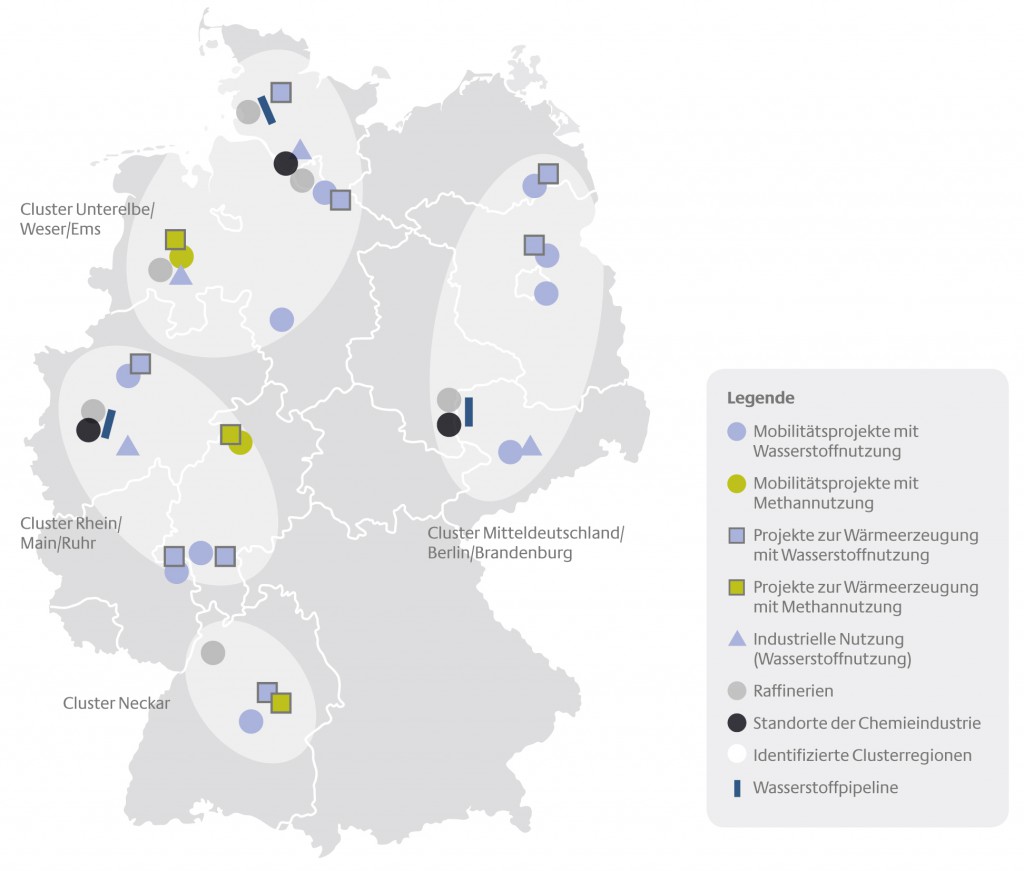
Four regions in Germany are particularly suitable as locations for the conversion of renewable energy to gas (Power to Gas): Unterelbe-Weser-Ems, Mitteldeutschland-Berlin-Brandenburg, Neckar and Rhein-Main-Ruhr. This comes from a Potentiality Atlas created by the Power to Gas Strategy Platform of the German Energy Agency (dena), German Energy Agency. However, in order to promote market development, legal frameworks need to be improved in several areas.
‘Power to Gas is a key technology for climate protection and the energy transition,’ says Andreas Kuhlmann, dena’s Chief Executive. ‘Everyone says how important it is to harness renewable energy in all sectors – not only in the electricity sector, but also in mobility, industry and in buildings. Linking sectors is the key term and, for that, Power to Gas is a good solution that is available on an industrial scale. In our Potentiality Atlas we are offering political and economic decision makers an important basis for information. Ultimately, to enable a quick and significant reduction in greenhouse gas emissions, market access to Power to Gas must be made easier. There are promising initiatives in many regions. However, in national legislation there are still some obstacles that need to be removed.’
Political conditions: recognising the added value of Power to Gas
Among dena’s recommendations is that Power-to-Gas plants stop imposing charges on the end user when buying electricity, because electricity is not consumed through Power to Gas, but converted, stored and made available for other uses, thereby serving as a means of energy storage. These changes would be possible under the new Electricity Market Act. Without charging the end user, the cost balance sheet of Power-to-Gas plants would improve significantly.
The incorporation of the EU’s Fuel Quality Directive into German law would also be an important step. In this way, fuels produced from renewable energy would be classed as biofuels. In addition, the Erneuerbare-Energien-Gesetz (EEG), Renewable Energy Act (REA), should provide incentives for the storage – with the help of Power to Gas – of electricity from wind and solar installations that cannot be integrated. The current REA amendment does not rule this point out entirely.
Regions with potential and initiative
Several favourable factors come together in the four key regions. Various pilot projects already exist, and more are planned. Locations for generating electricity from renewable energy sources, and for using hydrogen and methane from Power to Gas, are available and can be linked effectively with each other. Particularly important here are the prospects for the use of hydrogen and methane in mobility, since Power to Gas has the best market opportunities in this sector. There are also benefits in linking locations in the chemical industry where hydrogen is used.
Finally, the key regions stand out insofar that state policy is making use of the scope that already exists and is aiming for the expansion of Power to Gas. North Rhine-Westphalia, for example, supports fuel cell buses in local public transport and hydrogen power in rail transport. Hesse, Hamburg and Lower Saxony have taken similar initiatives. Baden-Württemberg is promoting the expansion of the hydrogen infrastructure, particularly where fuel cell vehicles are concerned. In Berlin, too, the expansion of hydrogen service stations is planned. Brandenburg is preparing a policy for the promotion of energy storage systems, in which Power to Gas will be one of the main areas of focus.
In order to further develop Power to Gas in the key regions, cooperation between the various stakeholders at national, state and local level, and in industry and research, will need to be strengthened.

About the Potentiality Atlas
In the Power to Gas Potentiality Atlas, dena and its partners carried out investigations to determine which applications and which regions in Germany provided the best preconditions for market development, and what will have to be done to improve conditions generally. For the analysis, experts from politics, businesses, associations and research were consulted, and numerous studies were evaluated. The atlas should make it easier for businesses to find suitable locations for Power-to-Gas plants. Using the information, political decision makers can better assess the regional opportunities for the introduction of Power to Gas.
The Potentiality Atlas will be presented publicly on 21 June at the Annual Conference of the Power-to-Gas Strategy Platform in Berlin.
About Power to Gas
Power to Gas is a process by which renewable energy is used to produce hydrogen or methane. As a cross-sectoral system solution, Power to Gas can make a substantial contribution towards integrating renewable energy into various energy consumption sectors. For example, the gases produced through Power to Gas can replace fossil fuel sources in industry, transport and heating. Furthermore, Power to Gas enables the use of the natural gas network’s vast capacity for the storage of electricity which is generated from renewable energy sources but which cannot be integrated into the grid. Power to Gas has the potential to ensure long-term storage by using the natural gas network.
About the platform
The Power-to-Gas Strategy Platform supports the further development of the Power-to-Gas system solution. It is being implemented by dena, along with 37 partners from industry, research and associations.
Source
dena, press release, 2016-06-16.
Supplier
Deutsche Energie-Agentur GmbH (dena)
Power to Gas - Strategieplattform
Share
Renewable Carbon News – Daily Newsletter
Subscribe to our daily email newsletter – the world's leading newsletter on renewable materials and chemicals










